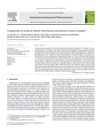A Honey Trap for the Treatment of Acne: Manipulating the Follicular Microenvironment to Control Propionibacterium Acnes
January 2013
in “
BioMed research international
”
TLDR The conclusion suggests a new acne treatment that controls bacteria by reducing water in the skin's pores using sugar-like substances.
The document discussed a novel approach to treating acne by manipulating the follicular microenvironment to control *Propionibacterium acnes*. It explored using honey, known for its antimicrobial properties, to create an unfavorable environment for the bacteria responsible for acne. The findings suggested that honey could effectively reduce the presence of *P. acnes* in the follicles, potentially offering a natural and effective treatment for acne without the side effects associated with conventional treatments. The study emphasized the need for further research on the follicular environment and the bacterial attributes that allow *P. acnes* to thrive.






